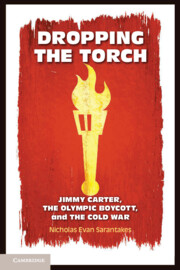Book contents
- Frontmatter
- Contents
- Acknowledgments
- Abbreviations
- Introduction Miracle on Ice
- Chapter 1 Lord Killanin and the Politics of the Olympics
- Chapter 2 Los Angeles versus Moscow
- Chapter 3 Jimmy Carter and U.S.-Soviet Relations
- Chapter 4 The Soviet Invasion of Afghanistan
- Chapter 5 The American Response
- Chapter 6 Easy Victories
- Chapter 7 Painful Losses
- Chapter 8 The White House Games
- Chapter 9 Coca-Cola, NBC, and the Defeat of the Iron Lady
- Chapter 10 The Vote in Colorado
- Chapter 11 Civil Wars
- Chapter 12 Carter versus Killanin
- Chapter 13 Moscow: The Olympics Are the Olympics
- Chapter 14 Los Angeles
- Chapter 15 Conclusion
- Epilogue
- Notes
- Bibliography
- Index
Chapter 10 - The Vote in Colorado
Published online by Cambridge University Press: 05 September 2012
- Frontmatter
- Contents
- Acknowledgments
- Abbreviations
- Introduction Miracle on Ice
- Chapter 1 Lord Killanin and the Politics of the Olympics
- Chapter 2 Los Angeles versus Moscow
- Chapter 3 Jimmy Carter and U.S.-Soviet Relations
- Chapter 4 The Soviet Invasion of Afghanistan
- Chapter 5 The American Response
- Chapter 6 Easy Victories
- Chapter 7 Painful Losses
- Chapter 8 The White House Games
- Chapter 9 Coca-Cola, NBC, and the Defeat of the Iron Lady
- Chapter 10 The Vote in Colorado
- Chapter 11 Civil Wars
- Chapter 12 Carter versus Killanin
- Chapter 13 Moscow: The Olympics Are the Olympics
- Chapter 14 Los Angeles
- Chapter 15 Conclusion
- Epilogue
- Notes
- Bibliography
- Index
Summary
The stalling-for-time approach that Lord Killanin and members of the USOC had been using appeared to be working. Public support was beginning to fade. Something had to be done to salvage this initiative and avoid embarrassing Jimmy Carter. Lloyd Cutler knew what was at stake and began to focus administration efforts on convincing the USOC to vote against participating in the Moscow Olympics. It was a battle the administration had to win, and Carter and Cutler were willing to use whatever tactics got results.
The administration was painfully aware that the boycott was falling apart, and Carter admitted as much in late April after the USOC had made its decision: “We are inducing dozens and dozens of other nations to join with us in a boycott of the Moscow Olympics this summer, an issue that was severely in doubt a few months ago.” To combat this trend, Jimmy Carter decided in early April to get more involved in the boycott. He instructed his staff to inject more boycott comments into his speeches.
Stalling for time seemed to be working. The Olympians were receiving information from their American friends that there might, in the end, be no damage to the gathering in Moscow when it was all said and done. Peter Ueberroth advised Monique Berlioux , “I firmly believe that there is still a good chance to salvage the Games of the XXIInd Olympiad if the Soviet Union would make a major gesture that would give President Carter the opportunity to change his position.”
- Type
- Chapter
- Information
- Dropping the TorchJimmy Carter, the Olympic Boycott, and the Cold War, pp. 180 - 195Publisher: Cambridge University PressPrint publication year: 2010



